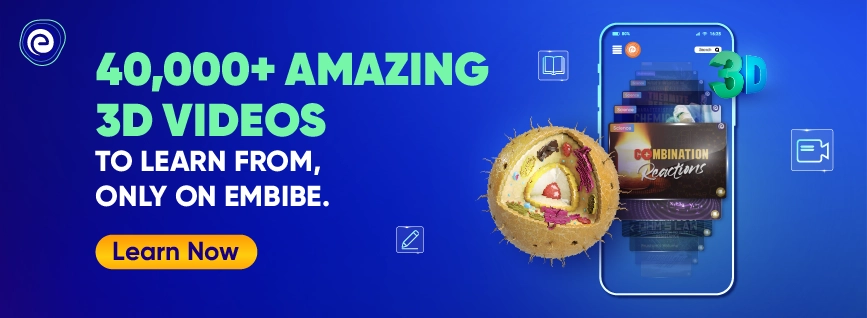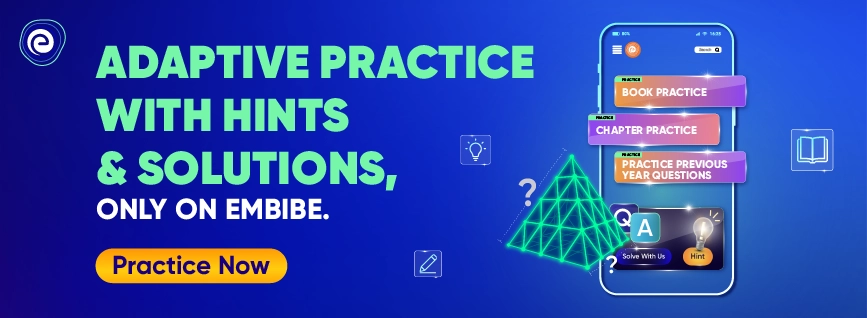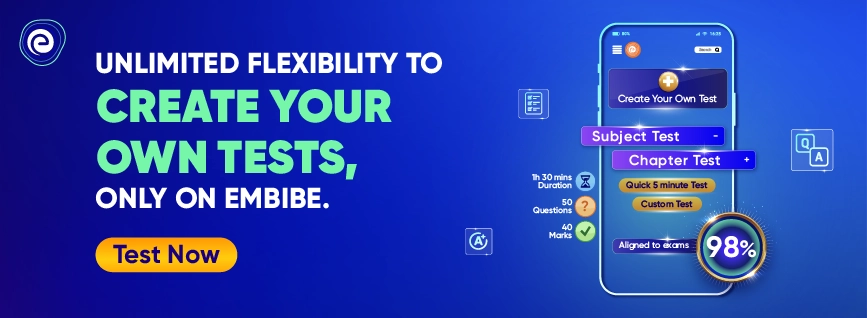- Written by Hrushikesh Vyas
- Last Modified on 4-12-2024
Nagaland Board Class 6 Exam 2025
The Class 6 curriculum of Nagaland Board imparts the basic knowledge to the students that is helpful to upgrade themselves and excel in higher education. Various Science experiments are included in the Class 6 curriculum, which give students good insights into the field of Science. Nagaland Board of School Education (NBSE) is responsible for promoting quality education for all the Class 6 students studying in the schools affiliated with the Board.
Various practice reforms related to the NBSE Class 6 exams are adopted by the schools as suggested by NBSE. It is essential for all the Class 6 students to familiarise themselves with the syllabus and know the exam pattern and blueprint so that they can prepare for the exams strategically. Keep reading to know all the details about Nagaland Board Class 6 at Embibe.
Nagaland Board Class 6 Exam Summary 2025
Nagaland Board Class 6 exams are conducted in the month of March or April every year. Students who are appearing for the Class 6 exams must collect their respective admit cards from their schools. The Nagaland Board prescribes the syllabus and textbooks to the students.
It is important for the students to know the syllabus, exam pattern and marking scheme to prepare well for the exams. Before getting into the details, let us have an overview of the Nagaland Board Class 6 exams.
| Particulars |
Details |
| Name of the Board |
Nagaland Board of School Education |
| Commonly Known as |
NBSE |
| Date of Establishment |
November 15, 1973 |
| Date of Functioning |
October 1, 1974 |
| Headquarters |
Kohima, Nagaland, India |
| Parent Organisation |
Department of Education, Nagaland |
Nagaland Board Official Website
https://nbsenl.edu.in/
Nagaland Board Class 6 Exam Syllabus 2025
Students appearing for the Nagaland Board Class 6 exams must be aware of the topics covered in the syllabus. Knowing the syllabus helps students frame effective preparation plans for completing all topics on time. Students can refer to the topics mentioned below to know about Nagaland Board Class 6 exam syllabus in detail.
Nagaland Board Class 6 English (Textbook- Honeysuckle) Syllabus
Completing the English syllabus is not a challenging task if students can complete one chapter each day. Understanding the gist of the topic helps students to frame the answers on their own while writing the exam. Students who find the English subject difficult can write down the answers after studying them to improve their writing skills.
| Chapter No. |
Chapter Name |
| 1. |
Who Did Patrick’s Homework?
A House, A Home |
| 2. |
How the Dog Found Himself a New Master!
The Kite |
| 3. |
Taro’s Reward
The Quarrel |
| 4. |
An Indian – American Woman in Space: Kalpana Chawla
Beauty |
| 5. |
A Different Kind of School
Where Do All the Teachers Go? |
| 6. |
Who I Am
The Wonderful Words |
| 7. |
Fair Play |
| 8. |
A Game of Chance
Vocation |
| 9. |
Desert Animals
What if |
| 10. |
The Banyan Tree |
Nagaland Board Class 6 English (Textbook- A Pact With The Sun) Syllabus
English exam preparation requires students to focus on sentence formation and grammatical skills. Students must also go through the previous year’s question papers to know the frequently asked questions. Below mentioned is the detailed syllabus that the students must follow from the A Pact With The Sun book.
| Chapter No. |
Chapter Name |
| 1. |
A Tale of Two Birds |
| 2. |
The Friendly Mongoose |
| 3. |
The Shepherd’s Treasure |
| 4. |
The Old-Clock Shop |
| 5. |
Tansen |
| 6. |
The Monkey and the Crocodile |
| 7. |
The Wonder Called Sleep |
| 8. |
A Pact with the Sun |
| 9. |
What Happened to the Reptiles |
| 10. |
A Strange Wrestling Match |
Nagaland Board Class 6 English Writing Section Syllabus
The English writing section is one of the interesting aspects of Class 6. Students must focus on English writing as it helps them in future. Notice writing, debate and speech build fundamentals for the students to score good marks in higher grades. They are also beneficial for the students once their schooling is done and they come across employment opportunities.
| Chapter No. |
Chapter Name |
| 1. |
Formal Letter |
| 2. |
Informal Letter |
| 3. |
Diary Entry |
| 4. |
Notice Writing |
| 5. |
Message Writing |
| 6. |
Debate |
| 7. |
Speech |
| 8. |
Article |
| 9. |
Report |
| 10. |
Story Completion |
Nagaland Board Class 6 English Grammar Syllabus
English grammar, especially the parts of speech and punctuation, helps students in developing their English language skills very quickly. It is important for students to understand the different parts of speech and how to identify them. Students can follow the NBSE Class 6 syllabus thoroughly and learn the basics of Grammar that would also help the students in longer run for their exam preparation.
| Chapter No. |
Chapter Name |
| 1. |
Noun |
| 2. |
Adverbs |
| 3. |
Adjectives |
| 4. |
Voice |
| 5. |
Tenses |
| 6. |
Verbs |
| 7. |
Pronoun |
| 8. |
Sentence and Phrases |
| 9. |
Subject-Verb Agreement |
| 10. |
Reported Speech |
| 11. |
Framing Questions |
| 12. |
Prepositions |
| 13. |
Conjunctions |
| 14. |
Punctuations |
Nagaland Board Class 6 English Applied Grammar Syllabus
To attain proficiency in the English language, it is important to put into practice what is learnt. Students must practice gap filling, dialogue completion, sentence reordering and sentence transformer to improve their writing skills. It helps to hone the basic Grammar skills of students. Based on the learning from this stage, the students can focus on enhanced or better learning.
| Chapter No. |
Chapter Name |
| 1. |
Gap Filling/Sentence |
| 2. |
Dialogue Completion |
| 3. |
Sentence Reordering |
| 4. |
Sentence Transformer |
Nagaland Board Class 6 Hindi Syllabus
Learning and writing the answers are very important to score good marks in the Hindi language. Students who will be appearing for Nagaland Board Class 6 Hindi need to focus on the basics so that they can be well-prepared for the exam. This helps students in avoiding spelling errors that may occur. Following are the chapters of the Hindi Syllabus:
Nagaland Board Class 6 Hindi Textbook- बाल रामकथा
The Bal Ram Katha textbook of Class 6 Hindi consists of 12 chapters. Students can cover one topic each day to gradually complete studying the entire textbook quickly. It is advisable that students schedule their weekend reputation as well depending on what they studied throughout the week. The detailed topics list of the Hindi Bal Ram Katha textbook is provided below.
| Chapter No. |
Chapter Name |
| 1. |
अवधपुरी मे राम |
| 2. |
जंगल और जनकपुर |
| 3. |
दो वरदान |
| 4. |
राम का वन-गमन |
| 5. |
चित्रकूट में भरत |
| 6. |
दंडक वन में दस वर्ष |
| 7. |
सोने का हिरण |
| 8. |
सीता की खोज |
| 9. |
राम और सुग्रीव |
| 10. |
लंका में हनुमान |
| 11. |
लंका विजय |
| 12. |
राम का राज्याभिषेक |
Nagaland Board Class 6 Hindi Textbook- Vasantha
The Vasantha textbook of Class Hindi consists of a total of 18 chapters. Students must focus on learning and practice writing the answers. This improves writing skills so that students can deliver the answers in the exam easily. All the topics included in the Class 6 Hindi Textbook- Vasantha are provided below.
| Chapter No. |
Chapter Name |
| 1. |
वह चिड़िया जो |
| 2. |
बचपन |
| 3. |
नादान दोस्त (कहानी) |
| 4. |
चाँद से थोड़ी-सी गप्पें (कविता) |
| 5. |
अक्षरों का महत्त्व (निबंध) |
| 6. |
पार नजर के (कहानी) |
| 7. |
साथी हाथ बढ़ाना |
| 8. |
ऐसे-ऐसे (एकांकी) |
| 9. |
टिकट-अलबम |
| 10. |
झाँसी की रानी (कविता) |
| 11. |
जो देखकर भी नहीं देखते (निबंध),छूना और देखना (केवल पढ़ने के लिए) |
| 12. |
संसार पुस्तक है |
| 13. |
मैं सबसे छोटी होऊँ (कविता) |
| 14. |
लोकगीत |
| 15. |
नौकर (निबंध) |
| 16. |
वन के मार्ग में (कविता) |
| 17. |
साँस-साँस में बाँस (निबंध),पेपरमेशी (केवल पढ़ने के लिए) |
| 18. |
संत शिरोमणि रविदास |
Nagaland Board Class 6 Mathematics Syllabus
Mathematics requires consistent practice of the problems to attain speed and accuracy. Students must try to decode the step-wise problem-solving approach to know the exact method of attempting questions. Below mentioned is the detailed syllabus of Nagaland Board Class 6 Maths.
| Chapter No. |
Chapter Name |
| 1. |
Knowing Our Numbers |
| 2. |
Whole Numbers |
| 3. |
Playing with Numbers |
| 4. |
Basic Geometrical Ideas |
| 5. |
Understanding Elementary Shapes |
| 6. |
Integers |
| 7. |
Fractions |
| 8. |
Decimals |
| 9. |
Data Handling |
| 10. |
Mensuration |
| 11. |
Algebra |
| 12. |
Ratio and Proportion |
| 13. |
Symmetry |
| 14. |
Practical Geometry |
Nagaland Board Class 6 Science Syllabus
To score good marks in Science, students must know how to write the answer during examinations. It is essential for students to go through the previous year’s question papers and try answering the questions being asked. Below, we have mentioned the detailed syllabus of Class 6 Science.
| Chapter No. |
Chapter Name |
| 1. |
Food: Where Does it Come From? |
| 2. |
Components of Food |
| 3. |
Fibre to Fabric |
| 4. |
Sorting Materials into Groups |
| 5. |
Separation of Substances |
| 6. |
Changes Around Us |
| 7. |
Getting to Know Plants |
| 8. |
Body Movements |
| 9. |
The Living Organisms and Their Surroundings |
| 10. |
Motion and Measurement of Distances |
| 11. |
Light, Shadows and Reflections |
| 12. |
Electricity and Circuits |
| 13. |
Fun with Magnets |
| 14. |
Water |
| 15. |
Air Around us |
| 16. |
Garbage In, Garbage Out |
Nagaland Board Class 6 Social Science Syllabus
Preparing a study timetable that equally focuses on Geography, History and Political Science is the key to improving the overall Social Science exam performance. Also, map-pointing must be practised without fail to score good marks in Class 6 Social Science. In the sections below, we are providing important chapters that the students must learn to complete their Nagaland Board Class 6 Social Science syllabus.
Nagaland Board Class 6 Geography Syllabus
To effectively learn all the topics of Class 6 Geography, students must draft notes for each topic while studying. This makes the revision process very easy during the final exams. Students must be familiar with the chapter they must study so that theyc an complete the syllabus on time. All the Geography topics of Nagaland Board Class 6 are mentioned below.
| Chapter No. |
Chapter Name |
| 1. |
The Earth in the Solar System |
| 2. |
Globe: Latitudes And Longitudes |
| 3. |
Motions of The Earth |
| 4. |
Maps |
| 5. |
Major Domains of The Earth |
| 6. |
Major Landforms of The Earth |
| 7. |
Our Country – India |
| 8. |
India: Climate, Vegetation And Wildlife |
Nagaland Board Class 6 History Syllabus
History can be better learnt if students concentrate on Classroom teaching. To remember the concepts thoroughly, students should keep revising the topics daily so they can answer the questions in the exam much more easily. Following are the topics included in the Nagaland Board Class 6 History syllabus:
| Chapter No. |
Chapter Name |
| 1. |
What, Where, How and When |
| 2. |
From Hunting-Gathering to Food Production |
| 3. |
In the Earliest Cities |
| 4. |
What Books And Burials Tell Us |
| 5. |
Kingdoms, Kings and The Early Republic |
| 6. |
New Questions and Ideas |
| 7. |
Ashoka, The Emperor Who Gave Up War |
| 8. |
Vital villages Thriving Towns |
| 9. |
Traders, Kings and Pilgrims |
| 10. |
New Empires and Kingdoms |
| 11. |
Buildings, Paintings and Books |
Nagaland Board Class 6 Political Science Syllabus
The topics provided in the Nagaland Board Class 6 Political Science syllabus help students expand their knowledge on the Government, Panchayati Raj, Rural Administration, Elements of Democratic Government and many more. To learn the concepts of Political Science effectively, students must understand them by relating them to the current administration in India. The below table lists the topics included in the Nagaland Board Class 6 Political Science syllabus:
| Chapter No. |
Chapter Name |
| 1. |
Understanding Diversity |
| 2. |
Diversity and Discrimination |
| 3. |
What is Government? |
| 4. |
Key Elements of a Democratic Government |
| 5. |
Panchayati Raj |
| 6. |
Rural Administration |
| 7. |
Urban Administration |
| 8. |
Rural Livelihoods |
| 9. |
Urban Livelihoods |
Study Plan to Maximise Score in Nagaland Board Class 6 Exam
To achieve good grades in Nagaland Board Class 6 exams, students must follow a detailed study plan. A proper study plan ensures that they are aware of what to study and how to study. Every small step will therefore help them stay prepared for the exam in a better manner. We have mentioned some important preparation tips along with the study plan to help students write the exams with confidence.
Detailed Study Plan for Nagaland Board Class 6 Exam
A detailed study plan ensures that the student is focusing on each unit and subject thoroughly so that they can score good marks in the exam. It allows them to stay prepared and stay ahead of their competiton. Here, we have mentioned a detailed study plan for all the subjects so that students can score higher marks and their overall performance is improved.
- How to score good marks in Maths: Maths is one of the subjects that can be easily studied and scored. To gain good marks in Maths, students should spend 2-3 hours of their day in complete understanding and attaining proficiency in one chapter. Students must ensure that they finish practising all the chapters’ questions perfectly. Memorising the formulas is very important to score good marks in Maths.
- How to score good marks in Science: Science is one of the most interesting subjects. Students can go through some of the interactive 3D videos at Embibe to try and understand the concepts in-depth. It makes learning easier and effortless. Students must try attempting the sample papers and mock tests for self-assessment.
- How to score good marks in Social Science: To score maximum marks in Social Science, students must try to cover all the topics of the syllabus without fail. The best way to memorise the answers is to note them down as soon as they are learnt. Also, students can start studying the topics with more weightage and then move on to other topics. Unlike other subjects, Social Science requires a thorough revision from time to time.
- How to score good marks in English: English is another easily scorable subject. But, students must not miss out on studying grammar and composition writing. Although the poems and lessons can be studied and written naturally, grammar and composition writing requires special attention. Students must analyse the types of questions being asked in these sections and practice the answers accordingly.
Preparation Tips for Nagaland Board Class 6 Exam
Before exams, every student should formulate a plan for preparing for the exam. It is advisable that the students create their preparation tips at the beginning of the session only. They must stick to the preparation tips throughout the year and bring changes in them depending on their study schedule convenience. Here are some useful tips for scoring well in exams:
- Prepare a Well-Planned Schedule: A proper study plan should have equal importance given to all subjects and is essential for good exam preparation. A well-planned timetable also reduces the stress that a student may undergo to complete all the topics before exams. it is also important that the students strictly adhere to their study plans.
- Draft Subject-wise Notes: Notes are the best reference material for students during last-minute exam preparation. They help in quick revision and also help the students memorise the concepts with ease. However, students must ensure that the notes are appropriately drafted with precise information mentioned for each lesson.
- Prioritise Important Topics: To study important topics, students must know the chapter-wise marks distribution. Based on this, students can make a list of the topics that carry the maximum weightage, followed by other topics. Students should not miss out on studying any question from the important chapters list to be able to answer all the questions in the exam.
- Get the Doubts Cleared: Doubts should be cleared instantly. If students cannot understand any topic in the textbook, they can always ask their teachers. Guides and videos on the internet can also be used for understanding any topic better.
- Follow a Healthy Lifestyle: While preparing for exams, a healthy lifestyle is very important so that students perform to their best potential in the exams. Some of the healthy lifestyle habits include eating simple food and avoiding junk food, spending minimal time on social media or internet surfing, practising meditation or yoga, and inculcating a positive attitude and a confident personality.
Explore More About Nagaland Board Class 6
FAQs on Nagaland Board Class 6 Exam 2025
Q: What is the best way to prepare for the Nagaland Board Class 6 exams?
Ans: To perform better in Nagaland Board Class 6 exams, students must complete studying the entire syllabus of all subjects. They must attempt sample papers and practice all the previous years’ question papers. They must know the areas of improvement and work on them to perform well in the exams.
Q: What is the official website of the Nagaland Board?
Ans: The official website of the Nagaland Board is nbsenagaland.com
Q: When will the Class 6 Nagaland Board exam commence?
Ans: The Class 6 Nagaland Board exams 2025 may commence in the month of March or April 2025.
Q: Where can I find the syllabus for Nagaland Board Class 6 exams?
Ans: Students can find the syllabus for Nagaland Board Class 6 exams at Embibe.
Q: Where can I get the best guidance to prepare for Nagaland Board Class 6 exams?
Ans: To prepare for the Nagaland Board Class 6 exams, students can follow the Embibe App, as it has mock tests, practice questions and also conceptual videos to learn and understand the lessons.
List of Educational Institutions for Nagaland Board Class 6
Shortlisting the most suitable school considering all the factors is important for the students to obtain a quality-oriented education. Class 6 plays a crucial role for the students in establishing the fundamentals required to understand the topics of higher grades. Embibe has provided the list of the best schools for the Class 6 Nagaland Board.
| Name of High Schools |
Board |
Location |
| Govt. High School Aboi |
Government |
Aboi |
| Govt. High School, Naginimora |
Government |
Naginimora |
| Govt. High School, Tizit |
Government |
Tizit |
| Govt. High School, Mon |
Government |
Mon |
| Govt. High School, Heningkunglwa |
Government |
Heningkunglwa |
| Govt. High School, Ahthibung |
Government |
Ahthibung |
| Govt. High School, Tening |
Government |
Tening |
List of Future Exams After Nagaland Board Class 6
Students after attempting the Nagaland Board Class 6 exams have a wide range of opportunities to attempt the competitive exams. These exams are conducted at the national and international levels. They help students to test their interests, capabilities and knowledge acquired. Some of the competitive exams for which Class 6 students can appear are
- International Science Olympiad (ISO)
- International Mathematics Olympiad (IMO)
- English International Olympiad (EIO)
- General Knowledge International Olympiad (GKIO)
- International Computer Olympiad (ICO) International Drawing Olympiad (IDO)
- National Essay Olympiad (NESO)
- National Social Studies Olympiad (NSSO)
Some of the competitive exams for which Class 6 students can start preparing for:
- National Talent Search Examination (NTSE)
- National Level Science Talent Search Exam (NLSTSE)
- Indian National Olympiad (INO)
- GeoGenius
- National Interactive Mathematics Olympiad (NIMO)














































